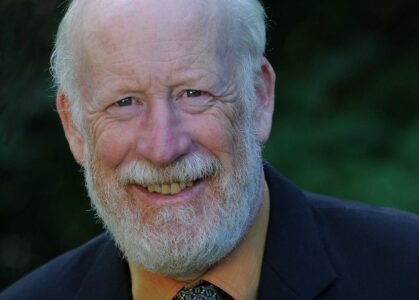The Meaning of Money
Arc of the Cognizant LXXXIV
The Wolf of Wall St., The New York Times, and Joni
“Keep your hands off of my stack, Jack.” – Pink Floyd, Money
“Money is an agreement. It doesn’t have any value at all, by itself.”
– Charles Eisenstein, Sacred Economics
“Money can’t buy me Love.” – The Beatles
By Charles Jeanes
On being rich: confessing my biases, sampling aphorisms
What makes a person rich? In ordinary, everyday speech, having a lot of money makes a person rich. Sure, I know. Real wealth is not material. Set that aside.
We possess money. Our money belongs to us. I like to delve into word meaning in historical development – etymology – to get a firm grasp on the significance of a word used a lot. Possess and belong are such words. I googled the words:
Possess: Late Middle English: from Old French possesser, from Latin possess- ‘occupied, held,’ from the verb possidere, from potis ‘able, capable’ + sedere ‘sit.’
Belong: Middle English (in the sense ‘be appropriately assigned to’): from be- (as an intensifier) + the archaic verb long ‘belong,’ based on Old English gelang ‘at hand, together with.’
From this wee tangent into word origins, I find that possessions have an affinity with “power” because potis [noun, Indo-European root speech] means “owner, master, host, husband”, and belongings are things at hand, with you. Very suggestive concepts, you agree? Person and things, fused.
Knowledge is power, is a fine phrase, but “money is power” makes more intuitive sense to us from common experience of our social and economic and political worlds.
Money is the root of all evil, is an intuition many people claim to have understood from their experience of life as well.
Power, money, evil: a simple trinity of concepts linked in common understanding. My own biases are in harmony with the linkage.
Evil is as evil does. This too is true. Not people, but their acts, are evil.
The very, very Rich: will they ‘do good’ for other human beings?
I doubt it. I truly do. I do not say they areevil. But money, like power, corrupts. The money they have, they amassed by capitalist doings. Such doings are, by the very operations of that system, the actions of powerful people taking advantage of others’ needs. One cannot own masses of things and act with justice toward other people. If you practiced justice, you’d soon own much less.
Eisenstein and Evil
Readers of my column know by now that I admire, and cite, Charles Eisenstein as much as I cite Charles Marx. (Karl, to most people). Eisenstein is insistent that we not label any other human an evil person. He decries the “othering” we perpetrate by seeing another person as not-me, when humans are spiritually part of one great whole, and all that exists in the human world is intricately, mysteriously, and necessarily united as a datum of how reality is structured.
No one is evil; people do evil things. This is his truth.
It is time we embraced Interbeing, and leave behind the narrative of Separation we have been telling ourselves for a very long time, he says:
“Evil is real—no less real than any other story… Humanity has been on a journey of Separation for thousands of years, and every crevice of that territory must be explored. The perpetrators and the victims of all we call evil have explored the furthest reaches of Separation. One might even define evil as separation: the total other-ing of a person, a nation, or nature, as well as the natural consequence of being cast into an alien universe separate from oneself.”
Money provides a motive to do evil
I will not go further into the Eisenstein universe; I respect his perspectives, and I would like to live in a sacred economy of The Gift as he is teaching it in his writing and teaching. Unfortunately for me, I cannot access his perceptions.
Here and now, my purpose is to write about the ideas in this column’s title.
The film The Wolf of Wall Street has been much vilified for not offering a moral tale, just a blunt description of the life of a man who knew how to make money spectacularly, and did so, regardless of the corruption. Leonardo Di Caprio has been trying to explain he did not mean to “glorify” the capitalist character he portrayed, who seemingly had a vacuum where his soul should have been.
This character was virtually a clone of Gordon Gecko from the much earlier film Wall Street; in that story,Michael Douglas had the juicy role of an anti-moralist who told the world “greed is good.” The capitalists played by Di Caprio and Douglas were humans enslaved to the narrative of Separation, in Eisenstein’s analysis. Money is their power, and they use it and abuse it at will. They cheat, lie, and laugh about it. Ebenezer Scrooges, unredeemed. No Christmas epiphany lifts their souls into the realm of human compassion.
My dislike of capitalists and capitalism is a moral dislike, not a scientific view of a phenomenon. In other columns I have acknowledged it: capitalism has done things for human life and the solving of our material challenges, that are demonstrably positive. Like Marx, “the scientist of revolution”, I also have understood the dialectic of destruction and creation that Capital generates.
But most of the time, my perspective on rich people is moralizing, not objective. I think they are bad for the planet and for society. If I could take all that the One Percent own and distribute it fairly among the poorest 60% of humanity, I would — even if it meant the immediate death of all the One Percent.
Eisenstein would find me a dull pupil. The evil I see in others, is in me too. We are all complicit. He tells his audiences and readers this consistently, insistently: the rich act as any one of us would if we too had huge wealth.
The New York Timesdiscovers Nelson: why am I disturbed by this?
Our local print newspaper, The Nelson Star, has just reported on a report, in The New York Times, about the ski tourism industry of the Kootenay Rockies.
When I read it, two hours ago, I had a bad reaction. “Oh no, the Rich are at it again. Now they will flock here because of what they read in the NYT” – and I do not want them to come here. They are super-rich, hyper-urban, and corrupted by the lives they live in capitalist affluence in places very unlike Nelson, and they want to visit our quaint hippie lifestyles up close as a tourist curiosity. We have seen this kind of writing before. Rolling Stone magazine has sold us to the world as a hip utopia, citing the cannabis industry as proof.
Gag me with a ski-pole. If I could stop them coming, I would. But of course the report says local people are very happy to know how well our tourist industry will do as a result of the global attention this NYT story brings on skiing the Kootenays. People still participating in the economy of old capitalism, with money to be made selling resort holidays, products, services and all the paraphernalia associated with jet-set tourism, are joyful at the prospect of More Business.
“The Sacred Economy of The Gift” will not be originated in the Kootenays by the people who market this region as a great place to visit and enjoy recreation.
Live and let live. Judge not, lest ye be judged. And so on and so forth.
“Money is not evil. Rich people are not evil… Repeat this mantra, and calm your agitated mind” — this is what I will have to do until I get my equilibrium back.
I have to stay away from reading Naomi Klein’s book, because she tells me facts that enrage me against capitalism. I have to stay away from the political postings on Facebook, put there by my progressive friends, for they too will whip up rage against Harper, US Imperialism, racists, fascists, killers of other species, pillagers of the land, pathological destroyers of justice…
Will I refrain from harvesting the abundant facts of injustice? Old habits die hard. This old farmer of doom will not easily give up his appetite for sad facts.
When the Dream dies, the Dreamers live on in sorrow
I must explain a personal angle to my extreme hostility to the rich, and to materialism generally. It is a story of my growing up an extreme idealist, and not adjusting to the realists’ world. I never stopped loving what I believed in the 1960’s, about liberation from possessions.
“We thought we could change the world, with words like love and freedom,” as the Eagles sang. I thought my generation meant to stop pursuing happiness by owning things. I discovered political activism. I embraced Marxian socialism. I believed my peers and I would change the world. Not much of that vision for the future was realized. Someone is to blame.
Joni Mitchell: why the Boomer Freedom revolution of the ‘60’s failed
Joni Mitchell was asked by Jian Ghomeshi why she thought the Boomers failed. It is worth finding the interview on youtube, as I did.
She described the world of our parents, moms at home, dads going off to work, suburban materialist dreams of the good life, and the effect on our parents and on us. We grew up with a solid level of affluence, not wealth but comfort, and were healthy and well educated.
Our mothers were unhappy in the suburban housekeeper/wife roles sold to them in the 1950’s and 1960’s; that world produced us, the Boomers, who thought their parents’ lives were empty.
“We all had houses, even though they were mortgaged. Our mothers had bought into the white picket fence… They got caught up in the competitive ‘keeping up with the Joneses,’ the cars took the husbands away from their homes… The mothers were housekeepers, they competed… you know — ‘My sheets are cleaner than yours. I’m the most important person on the block,’ and all that pettiness trickled down to the play of the children – us… Out of it came the first seeds, like, ‘Rebel without a Cause’…” Mitchell opines. “The sickness of the collapse of that Dream was vague. The houses contained these, for the most part, unhappy women. When the women are not singing in the kitchen, you’ve got a sick nation.”
“Whatever it was that came out of the breakdown of that dream, then came this liberated, spoiled, selfish generation, into the costume ball of it, you know? Free love, free sex, free music, whatever it was, we’re so free, free, free… and Woodstock was the culmination of that,” she said. “My generation for most of the ‘70’s fell into a state of apathy, sucked their thumbs. Heavy drugs followed light drugs, the thing got darker and they didn’t know where to take it. … Seeing the violence of ‘the pigs’ against their subculture, they didn’t have another plan.”
“They just didn’t have another plan and so they were converted into consumers… It went hippie, yippie, yuppie” she said, “Consume, consume… They went right into the thing that their parents did, on a bigger scale, on a greedier scale, make more money, make more money. Like the TV show Dallas, you know? – ‘Rich crooked people are good, Madonna ‘I’m the Material Girl” is good’… the role models were all shallow, acquisitive, and we were converted from naïve idealists.”
In the words of another cultural icon, Lawrence Kasdan, maker of the film The Big Chill, Boomers stopped caring about freedom and changing the world when we fell prey to “the Fear — of not having enough.” Poverty was rejected, after playing at it as hippies and peaceniks in the ‘60’s. Being poor was worse than anything else, and pursuit of happiness by wealth, through “the freedom money can buy”, became our path.
When Mitchell heard herself mouthing such critical views she asked Ghomeshi, “Am I being too negative?” I respect her self-awareness; I often feel the same.
She expressed my view exactly. Boomers went the same path as our parents, wanting to have things, but we took it much, much further. We became worse materialists by far. We lost our way after our “victories” in the USA; the end of a War and a President’s disgrace. Mitchell thinks the anti-war movement, of which she was no part, rallied people around a cause that “in terms of Revolution, just makes the people in power snicker.” Stopping that unpopular war could never transform society.
We did transform the culture in areas of styles, sexual mores, and music. Then Life became ordinary again. We had no blueprint for revolutionizing a whole society.
Confusions
My credo: Making money and being rich = perpetuating capitalism as it destroys our planet and kills people and other species.
The One Percent carry another 20 per cent riding on their coattails not intending to let go of their own personal affluence. That 20% includes the middle classes of all Western nations, and the wealthy fractions of third-world nations. How will capitalism be transformed when so many want it to continue to enrich them personally?
Reader, did you expect answers in this column? I hope not. You are middle-class like me, and possibly like me, a Boomer.
The past – History, if you like — explains context and process, but does not offer solutions; Eisenstein has some, so please read him. I hang hope on his being correct about humanity transitioning to a new ‘Narrative of Interbeing’, a changeover that will be managed without catastrophic rates of death or violence.
May this New Year bring more signs that the Eisenstein Perspex is a-borning.


























